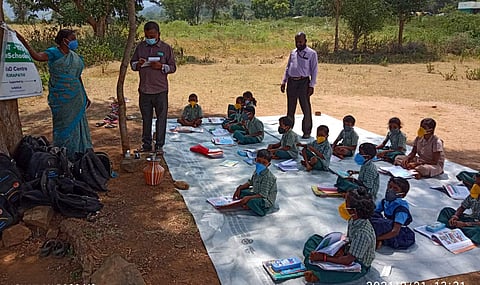

Teachers and scientists believe that Vatara Shale, the predecessor to Vidyagama, which focussed on interactive learning, would be the best mode from among the options available, to impart education to children in Karnataka.
Vatara Shale or village school is a micro-level intervention, wherein, around 20 students gather in an open space in a village and each subject teacher takes class once a week, ensuring continuity in education.
With a lack of chalk and board method, there was a need for alternative methods of pedagogy — and the 2020 pandemic gave birth to Math Mela, a hands-on activity-based Math learning class that would include children from multiple classes.
As the duration of these models was short, there was insufficient time to run an outcome analysis, an official said. But the efficacy was seen with 8-10 lakh out of 12 lakh children in the Kalaburagi division engaged in learning. It had the largest number of Vatara Shales at 33,000.
The division saw other interventions — Oduva Belaku in collaboration with the RDPR department that took activity-based learning inside panchayat libraries. With this, eight lakh students are registered with panchayat libraries, said Nalin Atul, Additional Commissioner of Public Instruction, Kalaburagi division.
Another alternative more suited to cities is Gunjbablad model — which was also suggested to the education department before schools reopened — where a parent will take under him or her a group of five students who will use one gadget to attend the multigrade activity classes where teachers teach concepts.
The Bharat Gyan Vigyan Samiti (BGVS), a people's science movement organisation largely comprising teachers and scientists, has been gathering from villages in Karnataka the ground reality of schools and a sense of what students and teachers want. "Unanimously, there is a demand for the Vatara Shale model as opposed to online mode," said Shubhankar Chakraborty, General Secretary BGVS.
The department survey revealed that 33 per cent of the 93.01 lakh students in the state had no access to devices for online classes.
